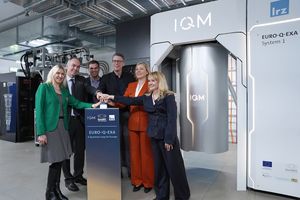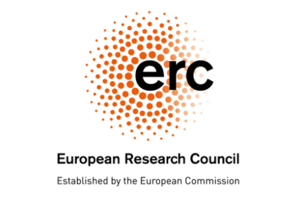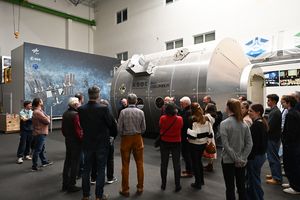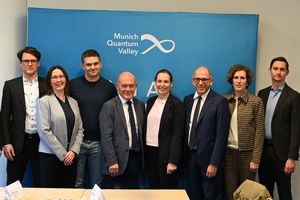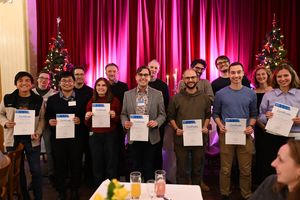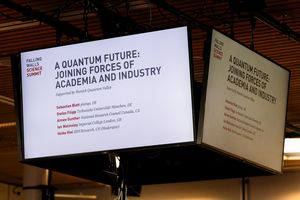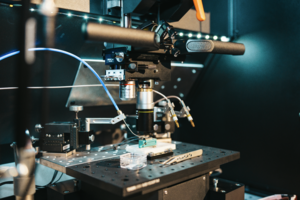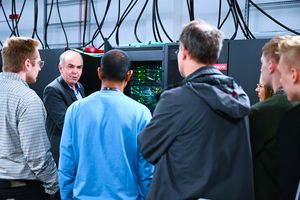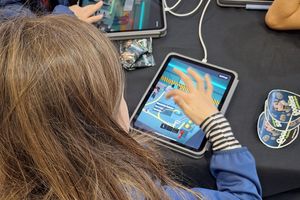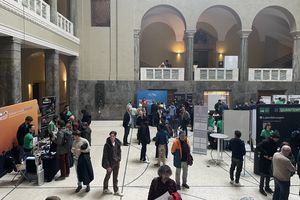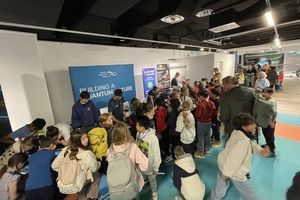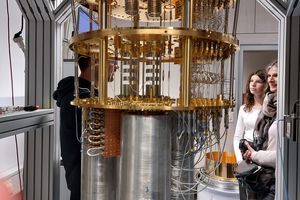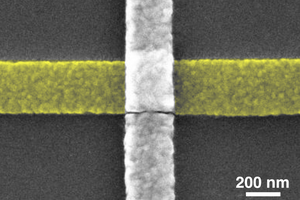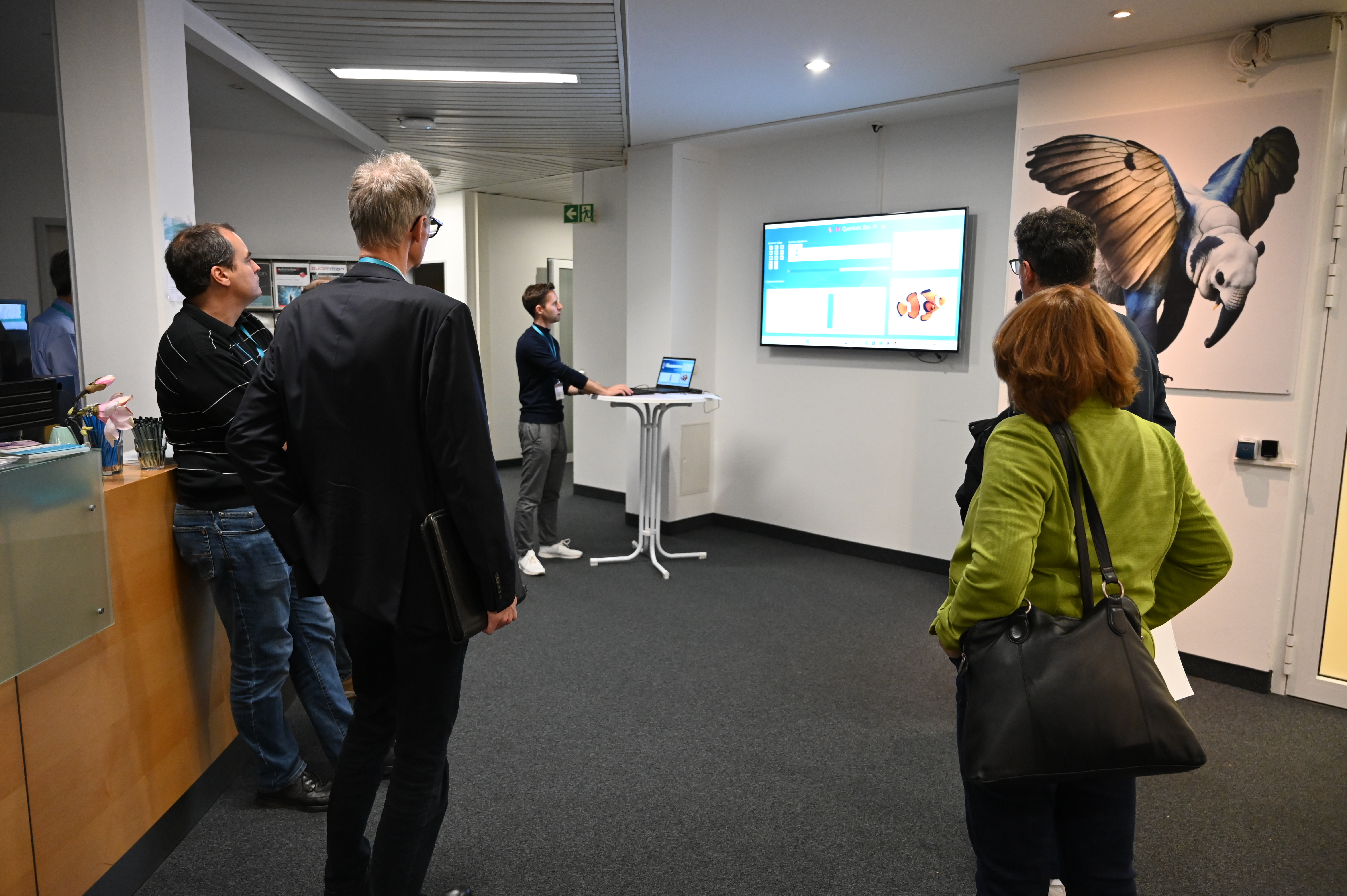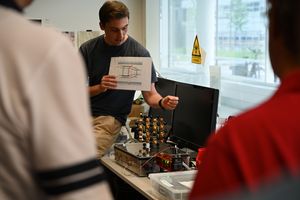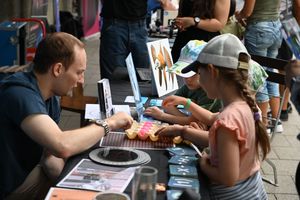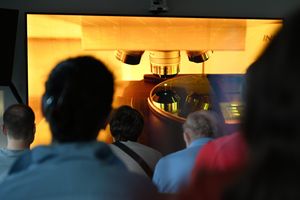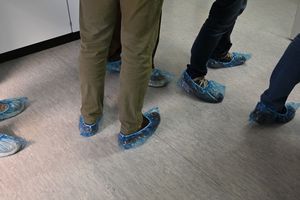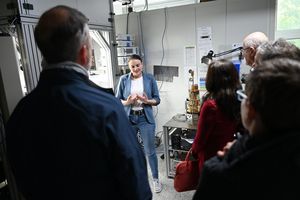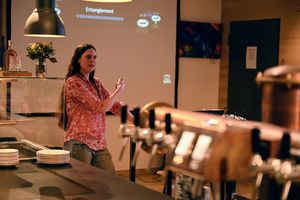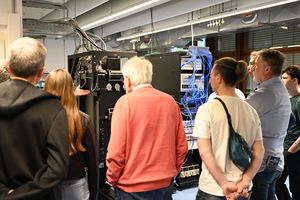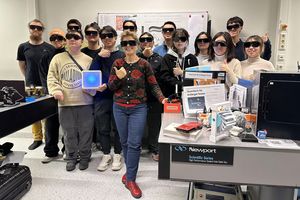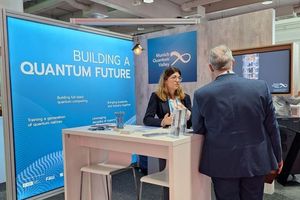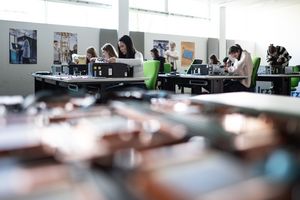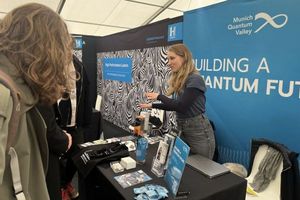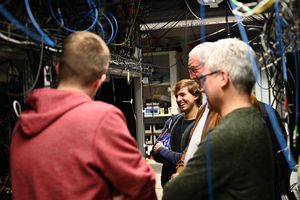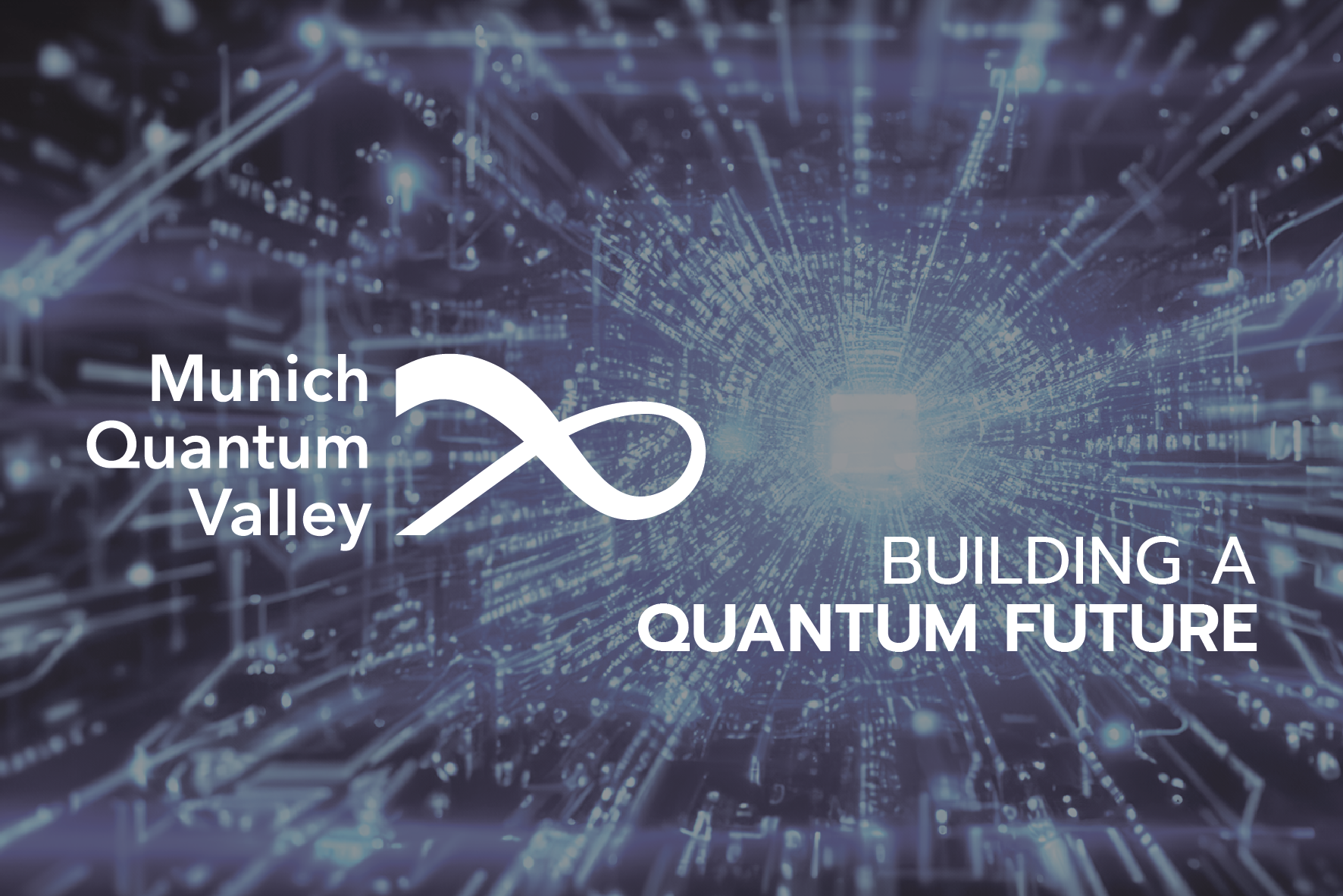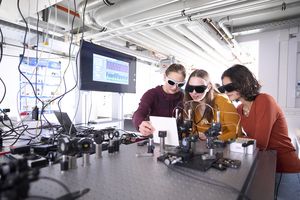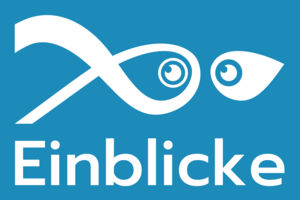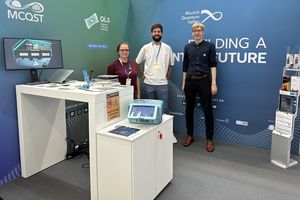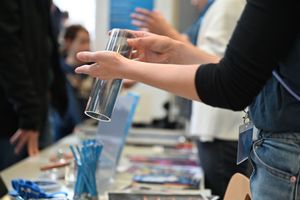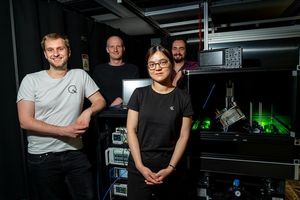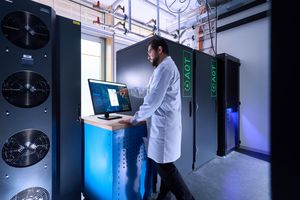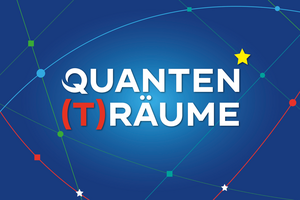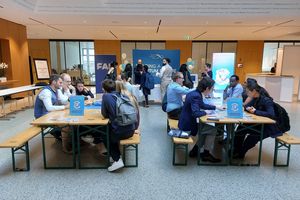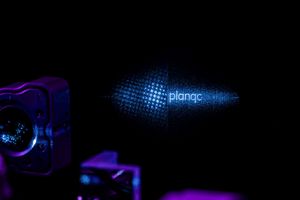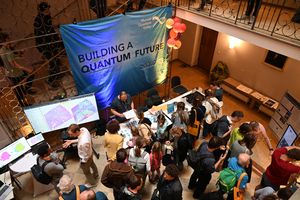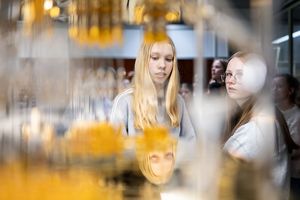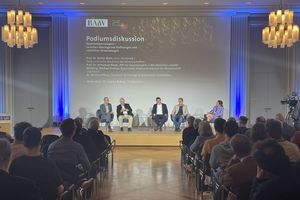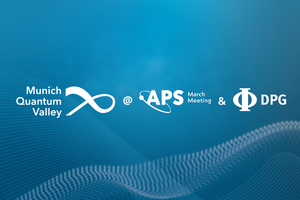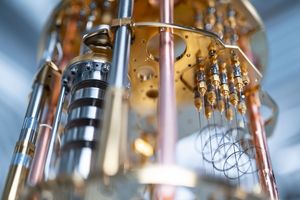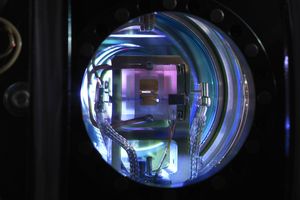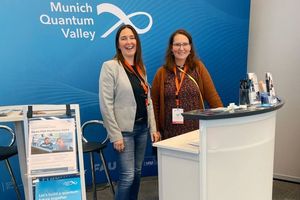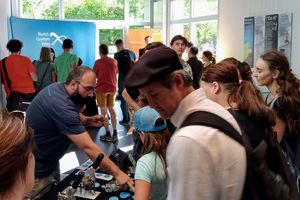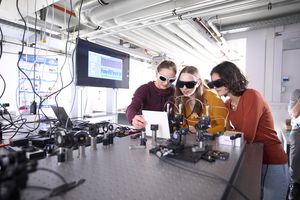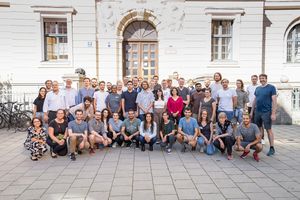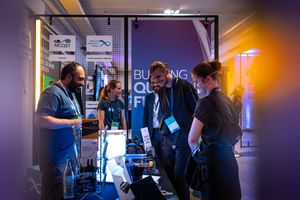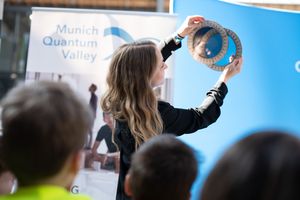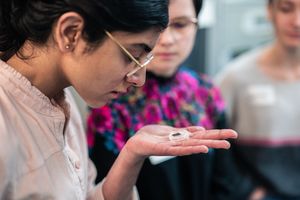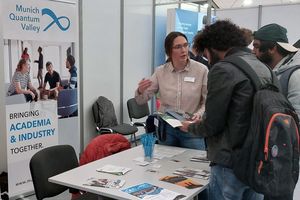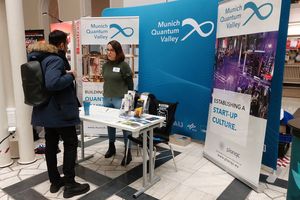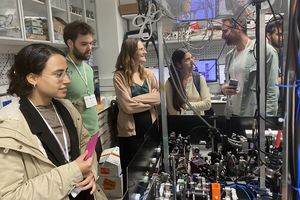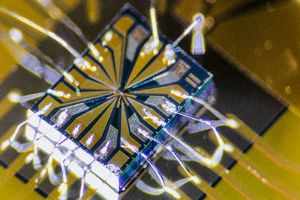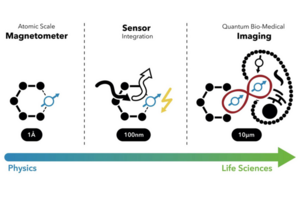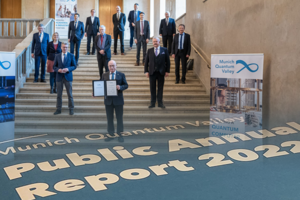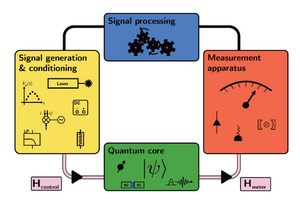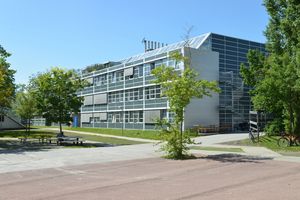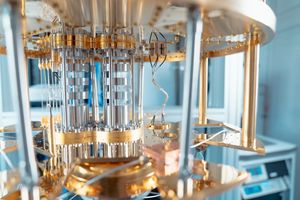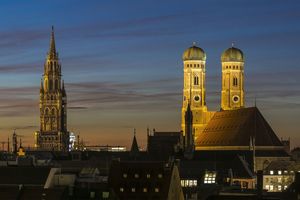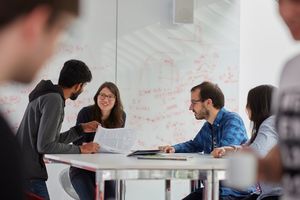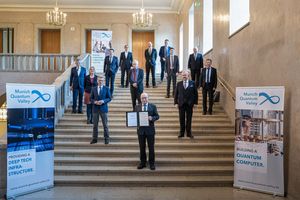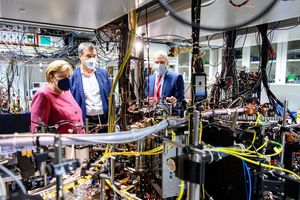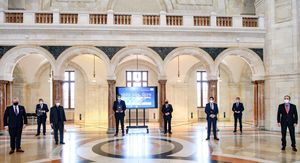
News
First European quantum computer for Germany: Euro-Q-Exa begins operation at Leibniz Supercomputing Centre
Today, Euro-Q-Exa, the first European quantum computer of the EuroHPC Joint Undertaking in Germany, went into operation at the Leibniz Supercomputing Centre (LRZ). The system has 54 qubits and is to be supplemented by an additional system with more than 150 qubits by the end of 2026. Connected to the LRZ's supercomputer, Euro-Q-Exa is now available to researchers in Europe and is intended to advance technical independence in quantum computing.
ERC Consolidator Grants for Christopher Eichler and Christian Schilling
MQV members Christopher Eichler of Friedrich-Alexander-Universität Erlangen-Nürnberg (FAU) and Christian Schilling of Ludwig-Maximilians-Universität München (LMU) have been awarded the prestigious Consolidator Grants of the European Research Council (ERC).
MQV-Einblicke: Quantum technologies in space operations
On 2 December, the German Space Operations Center (GSOC) in Oberpfaffenhofen opened its doors as part of the event series “MQV-Einblicke – 100 Jahre Quantenwissenschaften und woran wir heute forschen.” During a lecture and a tour of the institute, visitors gained exciting insights into satellite operations and learned about the potential that GSOC scientists see in quantum technologies for space operations.
Forward-looking exchange between Basque Quantum and Munich Quantum Valley
On 27 and 28 November 2025, a high-level delegation from the Basque government visited Munich Quantum Valley (MQV). The delegation met with MQV representatives from management and science to identify scientific and strategic interfaces between the two quantum hubs and explore potential areas of cooperation. The initial meeting has already generated concrete ideas for future joint projects.
Quantum Talents Symposium 2025
On 24 and 25 November 2025, the second edition of the Quantum Talents Symposium took place in Garching. Organised by Munich Quantum Valley (MQV) and other members of the Munich quantum community, the event brought together outstanding talents in quantum sciences from around the world to promote knowledge exchange and collaboration.
'A Quantum Future: Joining Forces of Academia and Industry' at Falling Walls Science Summit
At the Falling Walls Science Summit in Berlin, Munich Quantum Valley (MQV) brought together representatives from quantum innovation and technology to discuss how science and industry can collaborate to accelerate development and promote technology transfer.
MQV to receive the 2026 Technology Transfer Award of the German Physical Society
Munich Quantum Valley (MQV), the TUM School of Natural Sciences at the Technical University of Munich (TUM-NAT), and the Munich-based startup QuantumDiamonds will receive the prize for their pioneering development of innovative quantum sensors for fault analysis and measurement technology in the semiconductor industry.
MQV-Einblicke: Computing power at the highest level
On 12 November, interested visitors had the opportunity to explore the Leibniz Supercomputing Centre (LRZ) as part of the event series “MQV Einblicke – 100 Jahre Quantenwissenschaften und woran wir heute forschen”.
GALaQSci: With the smartphone game “Qookies” at the Spielwiesn in Augsburg
The Spielwiesn is an annual games fair that attracts game enthusiasts with thousands of board and card games, knowledge, and entertainment. This year, Munich Quantum Valley (MQV) participated for the first time as part of the GALaQSci project. From 7 to 9 November, visitors to the Augsburg exhibition halls had the opportunity to try out the game “Qookies,” which is being developed in the GALaQSci project.
Quantum Physics Day at LMU Munich
On 8 November 2025, the Faculty of Physics at LMU, together with the Munich Center for Quantum Science and Technology (MCQST), hosted a “Quantum Physics Day” with a colorful program for all interested parties. Munich Quantum Valley (MQV) welcomed visitors to its booth who were particularly interested in quantum computing.
Quantum technology in the shopping mall: MQV at FORSCHA 2025
From 10 to 12 October 2025, the science fair FORSCHA took place at the shopping center "Forum Schwanthalerhöhe" in Munich. Munich Quantum Valley participated once again in the interactive fair that invites people of all ages to experience knowledge firsthand.
MQV-Einblicke: Researching quantum systems at the lowest temperatures
As part of the event series “MQV-Einblicke – 100 Jahre Quantenwissenschaften und woran wir heute forschen”, the Walther Meißner Institute of the Bavarian Academy of Sciences and Humantities opened its doors on 6 October 2025, giving the many visitors insights into research on quantum systems at the lowest temperatures.
Nobel Prize in Physics goes to three quantum researchers
In the anniversary year of quantum mechanics, the Nobel Prize in Physics goes to three physicists for their research in the field of quantum mechanics, which also laid the foundation for current research at MQV.
MQV-Einblicke: Applications for quantum computers
On 11 September, the Fraunhofer Institute for Cognitive Systems IKS invited guests to attend our event series “MQV-Einblicke – 100 Jahre Quantenwissenschaften und woran wir heute forschen” and provided the interested audience with comprehensive insights into possible applications of quantum computing.
MQV-Einblicke: Individual light particles at the touch of a button
On 14 July 2025, the Walter Schottky Institute (WSI) of the Technical University of Munich (TUM) opened its doors as part of the event series “MQV-Einblicke – 100 Jahre Quantenwissenschaften und woran wir heute forschen”. During two lectures and a guided tour of clean rooms and laboratories, visitors were able to learn about the generation and detection of individual light particles and their important role in quantum technologies.
Quantum technology at the street festival
On 5 and 6 July 2025, Munich Quantum Valley took part in the Island Festival of the Deutsches Museum and gave interested visitors an insight into the world of quantum computers.
MQV-Einblicke: Not a grain of dust in sight in the HLL cleanrooms
On 1 July, the Max Planck Society's Semiconductor Laboratory (HLL) invited guests to its new premises on the Garching research campus as part of the “MQV-Einblicke – 100 Jahre Quantenwissenschaften und woran wir heute forschen” event series. Jelena Nincovic, long-time head of the laboratory, took visitors on an exciting journey into the world of high-precision semiconductor technology and the work carried out in the cleanroom.
MQV-Einblicke: How to design quantum materials
This Thursday, the Chair of Experimental Solid State Physics at the Ludwig-Maximilians-Universität München (LMU) opened its doors as part of the event series “MQV-Einblicke – 100 Jahre Quantenwissenschaften und woran wir heute forschen”. After an introductory lecture on two-dimensional crystals, the 30 visitors were given a lab tour to see the various stations for producing and researching these artificial crystals.
MQV-Einblicke: Cool cables at Fraunhofer EMFT
This Monday, the Fraunhofer Institute for Electronic Microsystems and Solid State Technologies EMFT invited guests to attend our event series “MQV-Einblicke – 100 Jahre Quantenwissenschaften und woran wir heute forschen.” After two introductory presentations, visitors had the opportunity to marvel at the exciting technologies up close in the laboratory.
Pint of Science quantum special: three evenings in the quantum pub
To mark the International Year of Quantum Science and Technology 2025, Munich Quantum Valley (MQV) organized a quantum special together with Pint of Science. On three evenings, everyone interested was invited to listen to exciting talks on quantum technologies in a relaxed pub atmosphere at the Haderner Bräustüberl.
MQV-Einblicke: Exploring the world of superconducting quantum computers
On 29 April, the two FAU researchers Florian Marquardt and Christopher Eichler gave two lectures as part of the event series "MQV-Einblicke – 100 Jahre Quantenwissenschaften und woran wir heute forschen" to give the numerous visitors exciting insights into the world of quantum computing. Those who managed to get a place on the lab tour then had the opportunity to learn more about the development, fabrication and operation of superconducting quantum chips.
PhotonLab international – school lab inspires visitors from all over the world
Enthusiasm for quantum physics unites across national borders! PhotonLab, the student laboratory at the Max Planck Institute of Quantum Optics (MPQ), in which Munich Quantum Valley (MQV) is also involved, therefore also offers its exciting experiments program to international visitors from all over the world. An overview on the occasion of today's World Quantum Day.
Munich Quantum Valley at the Hannover Messe 2025
As in the last two years, Munich Quantum Valley (MQV) was an exhibitor at the Hannover Messe. From March 31 to April 4, visitors to the stand were given the opportunity to find out more about quantum research in Bavaria.
Exploring supercomputers and quantum computers: MQV Girls'Day at the Leibniz Supercomputing Centre
What is it like to work as a computer scientist, physicist or mathematician in a computer center and to research supercomputers and quantum computers? On 3 April 2025, eight students aged 14 to 17 took the opportunity on Girls'Day to gain an insight into this career field and took part in the Munich Quantum Valley program, which this year took place in cooperation with and at the Leibniz Supercomputing Centre.
MQV at the DPG spring conferences 2025
This year, Munich Quantum Valley (MQV) was once again represented with booths at the spring conferences of the German Physical Society (DPG) of the sections Atoms, Molecules, Quantum Optics and Photonics (SAMOP) and Condensed Matter (SKM).
MQV-Einblicke: Looking inside a quantum optics laboratory
This week, the first regular event in the series “MQV Einblicke – 100 Jahre Quantenwissenschaften und woran wir heute forschen” took place at the Max Planck Institute of Quantum Optics (MPQ). During an introductory lecture and subsequent tour of the quantum optical laboratories at MPQ, the extremely interested audience gained insights into quantum simulation and quantum computing with neutral atoms.
"100 Jahre Quantenphysik – und das ist erst der Anfang": Successful start to the "MQV-Einblicke" event series
On Wednesday, Prof Rainer Blatt opened the series of events "MQV Einblicke – 100 Jahre Quantenwissenschaften und woran wir heute forschen" in the International Year of Quantum Science and Technology 2025 with his lecture "100 Jahre Quantenphysik – und das ist erst der Anfang" in the packed plenary hall of the Bavarian Academy of Sciences and Humanities.
Bavarian state government sets the course for the further development of Munich Quantum Valley
At its cabinet meeting on 11 February, the Bavarian state government reaffirmed its commitment to Munich Quantum Valley (MQV), thereby setting a bold course for its continued expansion. This decision paves the way for MQV’s overarching mission: to develop and operate cutting-edge quantum computers for real-world applications, in close collaboration with visionary start-ups and leading industrial partners.
22,222 visitors to the PhotonLab
For 13 years, the PhotonLab, the student laboratory at the Max Planck Institute of Quantum Optics, has been welcoming everyone who wants to learn about lasers, light and quantum physics. As of this Friday, a total of 22,222 students have visited the PhotonLab to experiment together.
Event series "MQV-Einblicke – 100 Jahre Quantenwissenschaften und woran wir heute forschen"
Experience cutting-edge research in quantum technology! In the International Year of Quantum Science and Technology 2025, the member institutes of Munich Quantum Valley open their doors and provide insights into their research through lectures and laboratory tours.
Munich Quantum Valley at Quantum Effects
Once again, Munich Quantum Valley was present at the Quantum Effects trade fair in Stuttgart.
Exploring quantum science – MQV at the Open Day in Garching
On 3 October, Munich Quantum Valley, in collaboration with the Leibniz Supercomputing Centre, took part in the campus-wide Open Day at the Garching research campus. The flow of visitors continued until the end of the event.
Quantum sensor technology for cancer monitoring wins Medical Valley Award
As part of the 'Munich Quantum Valley' Lighthouse Project IQ-Sense, researchers at the Technical University of Munich have developed a new method for the optical detection of MRI signals using diamond-based quantum sensors. In collaboration with the Hospital of the Ludwig-Maximilians-Universität München, the researchers now want to make their method applicable for clinical use in the field of cancer monitoring, for which they have received the Medical Valley Award.
Ion-trap quantum computer ready for novel research and development at the LRZ
The ion-trap quantum computer from Alpine Quantum Technologies, procured by the Leibniz Supercomputing Centre and Munich Quantum Valley, is now operational at LRZ's Quantum Integration Centre, making it the first of its kind in a computing center.
Quantum dreams and spaces for the future
MQV is a partner in the joint project Quanten(t)räume – a play of German word quantum spaces and quatum dreams – funded by the Federal Ministry of Education and Research (BMBF). Starting next Tuesday, the project will offer regular opportunities to find out about the state of research in the field of quantum technologies, ask questions to the experts and contribute your own ideas for useful applications.
MQV at the Bavarian Evening of the 73rd Lindau Nobel Laureate Meeting
On 4 July 2024, the traditional Bavarian Evening took place as part of the 73rd Lindau Nobel Laureate Meeting. This year, the conference focused on quantum physics and quantum technologies. Munich Quantum Valley contributed to the program of the Bavarian Evening with a booth and QuantenSchafkopf.
planqc secures €50 million in Series-A funding
MQV start-up planqc has just announced the successful closing of its first significant round of venture capital funding.
A whole weekend full of quantum: MQV at FORSCHA and the Island Festival
As in previous years, Munich Quantum Valley (MQV) was present at the FORSCHA trade fair from 28 to 30 June, which took place as part of the Munich Science Days in the Verkehrszentrum of the Deutsches Museum. At the same time, the Deutsches Museum celebrated the Island Festival over the weekend. The MQV was also on site with experiments and exhibits.
Open Day of the Bavarian Academy of Sciences and Humanities
Last Saturday, Munich Quantum Valley took part in the Open Day of the Bavarian Academy of Sciences and Humanities, informing the numerous visitors about the basics of quantum physics and research into quantum computers.
A day as a microtechnologist: MQV Girls'Day at the Fraunhofer EMFT
15 students aged 14 and 15 took part in the Girls'Day program of Munich Quantum Valley (MQV), which was held this year in collaboration with and at the Fraunhofer Institute for Electronic Microsystems and Solid State Technologies (EMFT).
Quantum Symposium of the Bavarian Academy of Sciences and Humanities
Last week, the Bavarian Academy of Sciences and Humanities (BAdW) hosted a symposium on the topic of "Quantum technologies. Expectations of an important future technology" at its premises in the Munich Residence. Munich Quantum Valley (MQV) was one of the co-organizers.
Munich Quantum Valley at the March Conferences 2024
At no less than three conferences in three weeks, Munich Quantum Valley welcomed interested visitors to its booths this March. At the March Meeting of the American Physical Society (APS) in Minneapolis and at the Spring Meetings of the German Physical Society (DPG) in Freiburg and Berlin, MQV was presenting Bavarian quantum research.
Expectations of an important future technology: Symposium on quantum technologies in Munich
With the support of Munich Quantum Valley, the Bavarian Academy of Sciences and Humanities (BAdW) is organizing the symposium "Quantum Technologies. Expectations of an important future technology" with top-class lectures.
Munich Quantum Valley at the Spring Meetings 2024
This year, Munich Quantum Valley (MQV) will once again be exhibiting at the March Meeting of the American Physical Society (APS) in Minneapolis and at the Spring Meetings of the German Physical Society (DPG) in Freiburg and Berlin.
New project: Quantum Physics for All!
GALaQSci uses augmented reality and artificial intelligence to make the quantum world accessible in a playful way.
A trapped-ion quantum computer for Munich Quantum Valley
In cooperation with Munich Quantum Valley, the Leibniz Supercomputing Centre is procuring a quantum computer based on trapped-ion technology.
Munich Quantum Valley at Quantum Effects and EQTC
The trade fair season is slowly coming to an end, but also in October Munich Quantum Valley was present at two events in Germany.
MQV joins the Open Day in Garching
On 3 October 2023, the Max Planck Institute of Quantum Optics, together with Munich Quantum Valley and the Munich Center for Quantum Science and Technology, invited children and adults alike to take a look behind the doors of the institute and learn about the world of quantum optics and its technological applications, such as quantum computing.
Open Doors with the Munich Quantum Valley at the Max Planck Institute of Quantum Optics
Opening the doors for young and old is the motto on 3 October 2023 at the Garching research campus. The Munich Quantum Valley (MQV), the Munich Center for Quantum Science and Technology (MCQST) and the Max Planck Institute for Quantum Optics (MPQ) jointly invite to get to know the world of quantum (optics) with a colorful program.
Successful closure of the Quantum Future Academy 2023 in Munich and Berlin
The Quantum Future Academy (QFA) brings together young talents in the field of quantum technologies. The first part of the binational event took place in Israel in February. The second week-long academy in Germany concluded this year's program this past week.
The future of quantum technologies: MQV at the Festival of the Future 2023
From July 6 to 8, Munich Quantum Valley was part of the Festival of the Future on the Museum Island in Munich. At the booth, on panels and in workshops, MQV together with MCQST, PhotonLab and QL3 informed the diverse audience about quantum technologies.
Amazing Experiments and the Fascination of Quantum Computing: MQV at FORSCHA 2023
From 5 to 7 May, Munich Quantum Valley was part of the FORSCHA, which took place as part of the Munich Science Days at the Deutsches Museum Verkehrszentrum. Around 8,000 visitors attended the interactive festival of knowledge.
Smoking heads, cool experiments: the MQV Girls'Day
Ten female students aged 14 to 16 took part in Munich Quantum Valley's Girls'Day event. At the Walther Meissner Institute of the Bavarian Academy of Sciences and Humanities, they were able to learn about the profession of (quantum) scientist through a diverse program.
Munich Quantum Valley at the DPG Spring Meeting of the Condensed Matter Section
Munich Quantum Valley was represented with a booth at the DPG Spring Meeting of the Condensed Matter Section (SKM) as part of the Exhibition of Scientific Instruments and Literature from March 28 to 30.
Presenting bavarian quantum research at home and abroad: Munich Quantum Valley at the DPG and APS conferences
Munich Quantum Valley took part in two conferences in the first week of March: At the DPG Spring Meeting of the Atomic, Molecular, Quantum Optics and Photonics Section (SAMOP) in Hannover as well as at the March Meeting of the American Physical Society (APS March Meeting) in Las Vegas, MQV presented itself with a booth.
Quantum Future Academy 2023: Young researchers visit Israel
The Quantum Future Academy (QFA) is a bi-national event that brings together students from Israel and Germany in two week-long academies on quantum technologies. The first part of the program in Israel takes place this week.
Lighthouse project "Quantum circuits with spin qubits and hybrid Josephson junctions" explores the core of possible future quantum computers
Four research groups of the University of Regensburg (UR) started their work in the lighthouse project "Quantum circuits with spin qubits and hybrid Josephson junctions" at the beginning of the year. Within the project, which is funded by the Free State of Bavaria as part of the Munich Quantum Valley (MQV), they are investigating central components of possible future quantum computers based on semiconductor spin qubits and superconducting qubits.
Integrated quantum sensors for imaging and tissue analysis - Lighthouse Project IQ-Sense starts
The lighthouse project IQ-Sense began its work at the beginning of the year. As one of currently seven projects, it is funded by the Free State of Bavaria within the framework of Munich Quantum Valley (MQV) and aims to develop quantum sensors for application in biology and medicine.
Looking back at the first year
Today we celebrate the first anniversary of the foundation of the Munich Quantum Valley e.V. and look back on a successful year together with the Scientific Director of MQV, Prof. Rainer Blatt.
On this occasion, we are also releasing our first public annual report.
Lighthouse Project QuMeCo – research at the interface between physics and electrical engineering
Funded by the Free State of Bavaria as part of Munich Quantum Valley (MQV), QuMeCo is set to explore new and better measurement and control methods for quantum systems and took up its work at Friedrich-Alexander-Universität Erlangen-Nürnberg (FAU) beginning of January.
Leibniz Supercomputing Centre becomes German host for one of the six first European Quantum Computers
Earlier this week, the European High Performance Computing Joint Undertaking (EuroHPC JU) announced that the Leibniz Supercomputing Centre (LRZ) will be one of six sites to host the first European quantum computers.
About 1.2 million euros for doctoral scholarships
As part of the Munich Quantum Valley (MQV) initiative, the Free State of Bavaria is supporting six outstanding doctoral students in their research in the field of quantum sciences with doctoral scholarships of around 200,000 euros each. The internationally selected top talents will conduct research at the Friedrich Alexander University Erlangen-Nuremberg (FAU), the Ludwig Maximilian University Munich (LMU) and the Technical University of Munich (TUM).
Around 20 million euros for new professorships in Bavaria
The universities in Augsburg, Würzburg, Erlangen-Nuremberg and Munich, as well as the technical universities of applied sciences in Regensburg and Nuremberg, will receive around twenty million euros in funding from Bavaria's High-Tech Agenda to enable them to further strengthen their profile in quantum sciences and quantum technologies.
When quantum particles fly like bees
A quantum system consisting of only 51 charged atoms can assume more than two quadrillion different states. Calculating the system's behavior is a piece of cake for a quantum simulator. Yet even with todays supercomputers it is almost impossible to verify the result. Researchers of the Munich Quantum Valley (MQV) initiative and the University of Innsbruck have now shown how these systems can be described using equations from the 18th century.
Mikhail Lukin Explores the “New Frontier of Quantum”
The Munich Center for Quantum Science and Technology (MCQST) is hosting a series of three different talks by Harvard physicist and MCQST Distinguished Lecturer Mikhail Lukin in Munich in May.
Fit for quantum: Around one million euros for teaching in quantum technology
Making young scientists fit for quantum technologies: The universities in Augsburg, Bayreuth, Erlangen-Nuremberg, Munich, Regensburg, and Würzburg will each receive around 144,000 euros in funding from the High-Tech Agenda Bavaria.
Foundation of the Munich Quantum Valley e.V.
Just one year after the Bavarian state government issued its declaration of intent, the founding document was signed ceremonially at the Bavarian Academy of Sciences and Humanities to mark the formal establishment of the Munich Quantum Valley as a registered association. Supplementing the funding of 300 million euros from Bavaria’s Hightech Agenda the initiative’s members have already raised federal funds totaling more than 80 million euros.
"It’s so great to see the passion, the verve, with which the work is done here“
German Chancellor Angela Merkel and Bavarian Prime Minister Markus Söder are delighted by their impressions into research and networks at MPQ and express their further support.
Quantum research could be the spring of the next big technological revolution and a seed for wealth. A good reason for German Chancellor Angela Merkel and Bavarian Prime Minister Markus Söder to visit the Max-Planck-Institute of Quantum Optics in Garching near Munich, one of the top places in quantum research in the world, to see the current state of science and its prospects for the future. The State of Bavaria has recently funded the new Munich Quantum Valley initiative with 300 million euros, while the German Federal State provides 2 billion for quantum research as part of its economic stimulus package. The MPQ plays a central role in this development due to its world-renowned expertise and excellent international networks.
Munich Quantum Valley kicks off
Bavaria's leading scientists and universities kick off a new research initiative to promote quantum science and develop new quantum technologies. The Free State of Bavaria is supporting the project with 300 million euros.
